Promises unfulfilled: 71 years on, Kashmiris pay for UN silence
Incarcerated in their homeland for five months running, IOK punished for UN's failure to ensure plebiscite
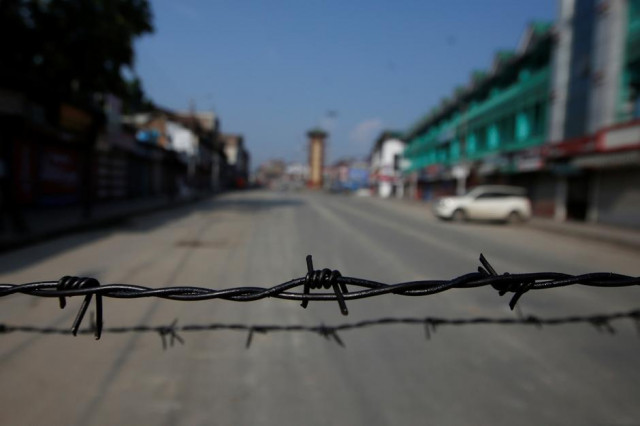
PHOTO: REUTERS
But in the time between the resolution was adopted, global commitment to that promise has wavered, even in the face of inhuman brutalities that the people of Occupied Kashmir now live through as normal.
‘India cannot silence Kashmiris by oppression, brutalities’
Last year, on August 5, the government of Narendra Modi decided to strip away the last vestiges of autonomy from the occupied region. With it, it dispensed with any pretensions of respecting basic human rights or even dignity that New Delhi could previously claim.
It will be five months today since the people of Occupied Kashmir were incarcerated within their homeland. Five months since the Modi government robbed them of their right to tell the world of their plight as it detained their leaders and whisked away their sons to still unknown prisons.
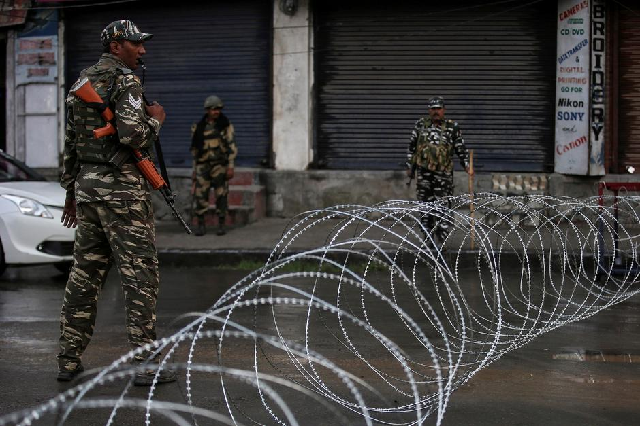 IOK. PHOTO: Reuters
IOK. PHOTO: ReutersThe silence around the world is deafening.
“It is unfortunate that the United Nations has not done anything to solve the oldest dispute lying on its agenda,” said Azad Jammu and Kashmir Prime Minister Farooq Haider Khan. “It is sad that the body which first legitimised the struggle of the Kashmiri people has done little since to honour its commitment to them.”
“The UN will be squarely responsible in event of war between Pakistan and India,” he noted. “Fulfilling our demand for the right to self-determination is the only way to ensure peace and tranquility in South Asia,” the AJK premier reaffirmed.
“The UN resolutions on Jammu and Kashmir provide a solid foundation to realise the objective of the Kashmiri people’s struggle,” said AJK President Masood Khan. “The world must act in accordance with their wishes if it wants to ensure regional peace.”
“Since August 5, the Indian government has locked down 80 million Kashmiris in their own homeland. It is a slap in the face of the UN and the global community at large for failing to hold a plebiscite as they promised,” said former AJK premier and All Jammu and Kashmir Muslim Conference President Sardar Attique Ahmad Khan.
“Kashmiris are punished for the silence of the UN,” lamented senior All Parties Hurriyat Conference leader Zaffar Akbar Bhat. “It is unfortunate how they do not find a viable solution to this dispute despite having observers stationed in Muzaffarabad and Srinagar.”
AJK legislative assembly member Abdul Majid Khan echoed Attique’s sentiments, calling the unresolved Kashmir dispute ‘a stain on the UN legacy.’ “This stain can only be washed by settling the Kashmir dispute according to the wishes of the Kashmiri people,” he said.
He urged the Pakistan government to push ahead with diplomatic efforts to remind the world how Modi and his ilk have pushed Muslims from Kashmir to Bihar’ against the wall.
Missed chances and the road ahead
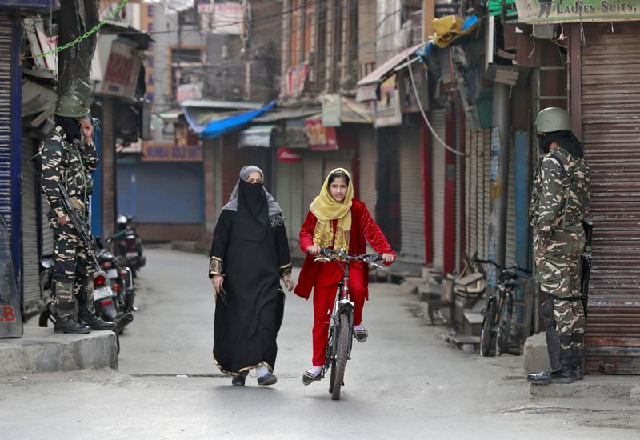 PHOTO: Reuters
PHOTO: ReutersSpeaking to The Express Tribune, Pakistani foreign policy experts bemoaned the failure of the government to capitalise on opportunities it had in the past year to raise the profile of Indian heavy-handedness in Occupied Kashmir.
“The world has always and will always place its own interests before anything,” said former ambassador Abdul Basit. “Unless we do our homework and put more effort in our attempts to build pressure on India, the global community will never take up the Kashmir issue the way we wish it would.”
“At present, I don’t feel we have the diplomatic capacity to mount a sustained campaign for the plight of Kashmiris,” he added.
Former foreign secretary Shamshad Ahmad Khan regretted that the momentum Prime Minister Imran Khan’s speech had built around the Kashmir dispute was squandered in the months that followed.
“Imran’s speech was a shockwave as far as global awareness on Kashmir goes, but due to other pressures, there were no concerted efforts to follow it up,” he said.
“There were several things that could have been done. Our missions in New York and Geneva should have been active. Of course, given his radical mindset and support base, Modi is not going to reverse his move, but this should mean we stay idle.”
One move that Shamshad suggested should have been Pakistan’s first one following the premier’s UN speech was to lobby to get the UN General Assembly to vote for obtaining an advisory opinion from the International Court of Justice on the Kashmir liberation movement.
Kashmiri leader urges international community to play 'practical role' for IOK
“That would have been a big initiative. It carries risks, yes. It would be a huge setback if it failed, but it would only fail if our diplomacy was inadequate,” he said, stressing this step should have been taken immediately after the UN address.
“We should also have brought more attention to India’s human rights abuses in Occupied Kashmir and should have used our diaspora to lobby for action in Western capitals,” Shamshad suggested. “Our envoys in countries where Nobel peace laureates reside should also have been mobilised. The Nobel laureates need to smell the gunpowder in the streets of Kashmir and prevent potential genocide.”
The former foreign secretary also pointed out the visit by the Duke and Duchess of Cambridge as a missed chance to raise the profile of the Kashmir issue by sensitising them to the situation in the disputed territory. “We need practical steps, not just statements, and tweets,” he stressed. He also lamented that “the Pakistani media has also not given Kashmir the kind of coverage it should have.”
“One step I have recommended again and again is that we must appoint a special envoy on Jammu and Kashmir,” noted Basit. “Unless we prove to the world how important Jammu and Kashmir is for us, it will never take us seriously.”
He added that Pakistan would also do well to look into what we can do at the bilateral level to impose some cost on India. “One thing we should do is transfer our high commissioner designate for India to somewhere else. As long as we have him sitting idle in waiting, it gives India the impression that we will revert to the status quo at some point. We need to send a signal that this is not the case,” the former envoy suggested.
“We should also look into closing our airspace to Indian airlines. It may hurt us somewhat, but it will also impose a serious cost on Delhi.”
Another step Basit recommended is setting up a Kashmir fund to collect money to alleviate the plight of Kashmiris in Occupied Kashmir. “We can engage international humanitarian organisations to ensure this money is used to help them,” he said.
Other steps he recommended were amending the AJK constitution to increase Kashmir representation and appointing a plebiscite advisor.
Internationally, Basit suggested shifting focus from other countries’ governments to their civil society. “Governments will have their hands tied by their own interests, but convincing the global civil society that what India is doing in Kashmir is inhumane will make the former’s position untenable,” he said. “We must engage their media and civil society organisations to change public perceptions. We should also consider launching an English language channel to disseminate our view on Kashmir globally.”
Legal expert Barrister Asad Rahim noted that the Pakistan government would also better serve the Kashmir cause by emphasising the importance of the UN-promised plebiscite. “The plebiscite is at the heart of the UN resolution and we would do well to look at our own obligations,” he said.
He agreed with Shamshad and Basit that Pakistan had so far, in the days after August 5, not emphasised India’s violation of human rights and the Geneva Convention enough.
‘Modi creating war-like situation to divert world’s attention from internal crises’
“The Bharatiya Janata Party manifesto has long called for the removal of Article 370 with a view to changing Occupied Kashmir’s demographics. Transferring native populations to alter a region’s demographic is clearly articulated as a war crime,” Rahim pointed out. “So going forward, Pakistan should take on the vocabulary of international humanitarian considerations to preempt any attempted demographic change in the disputed territory.”
Even so, Rahim was optimistic for the people of Jammu and Kashmir. “Because of Modi’s radical agenda, the international community, their civil society in particular, can clearly see trendlines in India. Their perception has already started to shift.”
He pointed to the case of Israel and Palestine in the minds of the global audience. “Within our lifetime, we have seen a paradigm shift on Israel in the West. Earlier, when Egypt and Syria had a belligerent attitude towards Israel, the world saw Palestine as simply a political issue. Now, however, the narrative has shifted,” he said.
“Similarly, the radical agenda of the Modi government is an opportunity for us. All the violence in Occupied Kashmir – the blinding of children, the rape of women, the incarceration of leaders who were once pro-India – we need to focus our narrative on that and the people of Kashmir to engage civil society around the world,”
Rahim added. “That is the real path to delegitimising Indian occupation.”

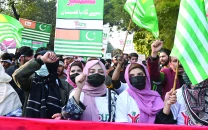
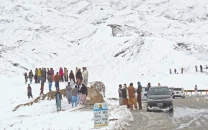
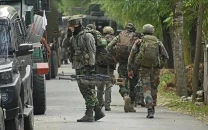
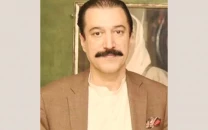
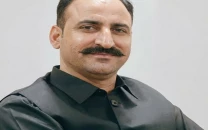
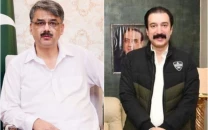












COMMENTS
Comments are moderated and generally will be posted if they are on-topic and not abusive.
For more information, please see our Comments FAQ